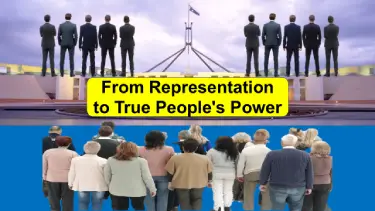Transforming Australias Democracy: From Representation to True People’s Power
Discover how Australias democracy can evolve from representation to a true people-powered system, using its monetary sovereignty.
Introduction
Australia’s current political system is termed a “representative democracy,” where citizens elect members of parliament to make decisions on their behalf. While this structure provides a degree of public participation, it often fails to be a true democracy “of the people, by the people, for the people.” Corporate interests and political elites often influence decision-making, leaving many Australians feeling disconnected from the process. This article explores how Australia can evolve its democracy to be more inclusive and representative, using its monetary sovereignty to ensure that the needs of all citizens are genuinely met.
Shortcomings of Representative Democracy
1. Current State of Representative Democracy in Australia
Definition and Structure: Representative democracy involves electing officials to make laws and policies on behalf of the public. While it provides a means for citizens to influence governance, the system can lead to decision-making that reflects the interests of a minority rather than the broader population.
Between elections, voters have limited direct influence over political decisions. Public participation is often reduced to occasional petitions, protests, or contacting representatives, which may not lead to significant policy changes.
Elected officials do not have to follow their constituents’ wishes once in office, allowing them to pursue agendas influenced by party lines, donors, and lobbyists instead. Furthermore, mechanisms like town hall meetings or public consultations often serve more as formalities than genuine opportunities for citizen input, leaving many Australians feeling powerless to affect decisions that impact their lives.
This disconnect between elections fosters voter apathy and disengagement, as citizens perceive that their voice has little impact beyond the ballot box.
Additional Information:
– Lobbying and Donor Influence: The influence of lobbyists and political donors can overshadow the preferences of ordinary voters. Policies and legislative decisions can be swayed by entities that provide financial support to campaigns, creating a system where political access and influence are tied to wealth and resources.
– Lack of Mechanisms for Citizen Input: While there are some channels for public engagement, such as giving feedback on proposed legislation or taking part in advisory committees, these are often limited in scope and impact. The absence of robust mechanisms like citizen-initiated referendums or recall elections means that voters have little recourse if their representatives do not act in their interests.
– Party Discipline: Australian political parties typically enforce strict discipline among their members, meaning that individual representatives may be compelled to vote along party lines, even if it conflicts with their constituents’ views. This reduces the effectiveness of public lobbying efforts targeting individual MPs.
Limitations and Criticisms
 1. Influence of Corporate Interests: Corporations and wealthy donors often have more influence on policy than ordinary citizens. This can result in policies that favour business interests over public welfare.
1. Influence of Corporate Interests: Corporations and wealthy donors often have more influence on policy than ordinary citizens. This can result in policies that favour business interests over public welfare.
2. Voter Apathy and Disengagement: A lack of faith in the political system leads to low voter turnout and increased numbers of informal votes, reflecting a disengagement with the political process.
2. Public Trust and Accountability Issues
Lack of Accountability: Many citizens feel their representatives are not held accountable for their actions. This feeling is worsened by the limited ability of the public to directly influence policy between elections.
Case Study: The National Anti-Corruption Commission (NACC): The NACC, set up to combat corruption, has faced criticism for being ineffective. While it can investigate politicians and public officials for serious or systemic corrupt conduct, its powers are limited. For example, public hearings are only allowed in exceptional circumstances, reducing transparency. Moreover, it cannot investigate state or local government officials, further limiting its scope.
Supporting information: https://www.nacc.gov.au/reporting-and-investigating-corruption/what-investigate
https://www.nacc.gov.au/reporting-and-investigating-corruption/what-investigate
3. Impact of a Flawed System
Policy Decisions Skewed Towards Privatisation and Corporate Benefits: Privatisation and outsourcing of public services have often led to poorer outcomes for citizens, with higher costs and lower quality services.
Social Inequities: Policies influenced by corporate interests often overlook critical social issues, such as affordable housing, healthcare, and education, worsening social inequality.
Why the Current System is Failing Australians
1. Growing Disillusionment with Major Political Parties
Both major parties, Labor, and the Coalition, have adopted neoliberal policies, often contrary to public demand for fair governance. This shift has resulted in many voters feeling politically homeless, driving the rise of minor parties and independents.
2. Underrepresentation of Marginalised Groups
Indigenous communities, poor individuals, and other marginalised groups are often excluded from the political conversation. This lack of representation results in policies that do not address their specific needs.
3. Consequences of Limited Engagement
Economic and Social Costs: Rising economic inequality, housing affordability issues, and workforce casualisation are direct outcomes of policies favouring the wealthy. Environmental policies are similarly compromised, often influenced by industries that receive help from lax regulations.
Transforming Australia’s Democracy
1. Implementing Direct Democracy Mechanisms
Citizen-Initiated Referendums and Plebiscites: Introduce mechanisms allowing citizens to propose and vote on laws directly. This can bypass traditional legislative bottlenecks and ensure policies reflect public sentiment.
Participatory Budgeting: Enable communities to decide how public funds are distributed for local projects, ensuring spending aligns with community needs and priorities.
VoteWrap: For a Representative Democracy to be a functioning democracy there needs to be an effective, efficient & timely way for the voters of each electorate to tell their Representative how they want them to vote on Bills before Parliament.
2. Strengthening Democratic Institutions
Reforming the National Anti-Corruption Commission (NACC): The NACC needs enhanced powers, such as broader authority to investigate past misconduct and increased transparency in proceedings. This would allow it to act more effectively against corruption at all levels of government.
Setting up an Independent Federal Anti-Corruption Body: Expand the NACC’s powers to include investigating historical cases of corruption and allow public hearings in more cases. This would improve transparency and public trust.
3. Expanding Public Engagement and Transparency
Reforming Political Donation Laws: Implement stricter limits on political donations and increase transparency around lobbying activities to reduce undue influence on policy.
Enhancing Access to Government Data: Make government data and decision-making processes more accessible to the public to improve accountability and enable informed citizen participation.
4. Leveraging Australia’s Monetary Sovereignty for Public Good
Public Funding for Essential Services: Use Australia’s monetary sovereignty to directly fund public infrastructure, healthcare, education, and housing. This would ensure that essential services are adequately provided without relying on private sector intermediaries.
Investing in Sustainable Development: Direct public funds into renewable energy, public transport, and sustainable infrastructure to ensure long-term economic and environmental health.
Summary
Australia’s representative democracy has significant room for improvement. By implementing direct democracy mechanisms, reforming the NACC, and using monetary sovereignty, Australia can create a more inclusive political system. Citizens must advocate for these changes to build a democracy that genuinely reflects their will and serves their interests.
Question for Readers
What changes do you believe would make Australia’s democracy more representative and effective?
Call to Action
If you found this article insightful, explore more about political reform and Australia’s monetary sovereignty on Social Justice Australia: https://socialjusticeaustralia.com.au/.
Share this article with your community to help drive the conversation toward a more just and equal society.
Click on our “Reader Feedback” menu. Let us know how our content has inspired you. Submit your testimonial and help shape the conversation today!
Additionally, leave a comment about this article below.

